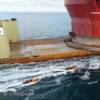As the International Maritime Organization grapples with the issue of the phasing in of safer tanker tonnage around the world, local political pressure in France is pushing the country towards acting within the confines of the EU to ensure safer ships, ala the OPA 90 regulations enacted in the wake of the Valdez disaster.
The sinking off the coast of France of a tanker carrying toxic chemicals could push the European Union to speed up a planned crackdown on shipping safety, local media was reporting in the wake of the latest downing of a ship carrying environmentally harmful materials off the coast of France.
The Italian tanker Ievoli Sun sank in the Channel with 6,000 tons of toxic chemicals aboard.
A navy spokesman said observed fuel slicks, measuring between 300 yards and 2.5 miles, could have come from the downed ship or from any number of vessels cleaning out their tanks. "Unfortunately, a certain number of vessels taking advantage of the sinking of the Ievoli Sun might be tempted to degas as they pass the coast near Cherbourg, in the zone of the shipwreck," Commander Olivier Lajous said.
The second major shipping disaster in a year in the seas off northwestern France has triggered protests among local residents and sparked new calls for European-wide shipping safety rules.
The daily Liberation said in an editorial that it was time for France, which holds EU's rotating presidency, to stop pandering to a minority of nations, which resist measures such as the creation of a European maritime safety body.
Traditional shipping powers such as Greece, Britain, Denmark and the Netherlands are opposed to what they see as bureaucratic interference in the sector. Liberation called on French Transport Minister Jean-Claude Gayssot to overrule their objections by calling a qualified vote on the issue.
"May the sinking of the Ievoli Sun at least hasten the moment when determination takes over from gesticulation," the newspaper said.
Cloudy underwater pictures taken by a French minesweeper did not show any breach in the hull of the sunken tanker, which had not moved from its resting place 235 ft. (70 m) below the waves. Although there was no indication as to what caused the accident, Gayssot pinned the blame on what he called the "savage liberalization" of the shipping sector which placed low costs before safety. EU transport ministers last month reached a compromise on proposals by Transport Commissioner Loyola de Palacio for stricter checks on ships visiting EU ports and for oil tankers with a single-skinned hull to be banned from EU waters.
The measures were prompted by anger over the heavy pollution caused to France's Atlantic coastline after the 25-year-old single-hulled tanker Erika broke up last December. The Maltese-flagged vessel released 10,000 tons of heavy oil into the sea, soiling 250 miles of coastline and seriously damaging the environment, fishing and tourism.
A poll published by the daily Le Parisien found that despite those efforts, 50 percent of French people blamed European authorities for the latest accident, saying they failed to take appropriate measures after the Erika disaster. The Transport Ministry said in a statement that Gayssot would ask his European counterparts to implement the new rules voluntarily by the end of the year, without waiting for the blessing of the European Parliament.
In an apparent rebuttal of Liberation's criticisms, it said efforts to build a consensus among EU states had permitted rapid progress in talks with the International Maritime Organization and a common set of rules could be adopted in early 2001. "This would permit the renewal of more than a third of the world's fleet of oil tankers by 2005 and two thirds by 2010," the Transport Ministry said. -(Reuters)
Sponsored Content
Innovative Hull Maintenance: Profitable & Green

Subscribe for
Maritime Reporter E-News
Maritime Reporter E-News is the maritime industry's largest circulation and most authoritative ENews Service, delivered to your Email five times per week












